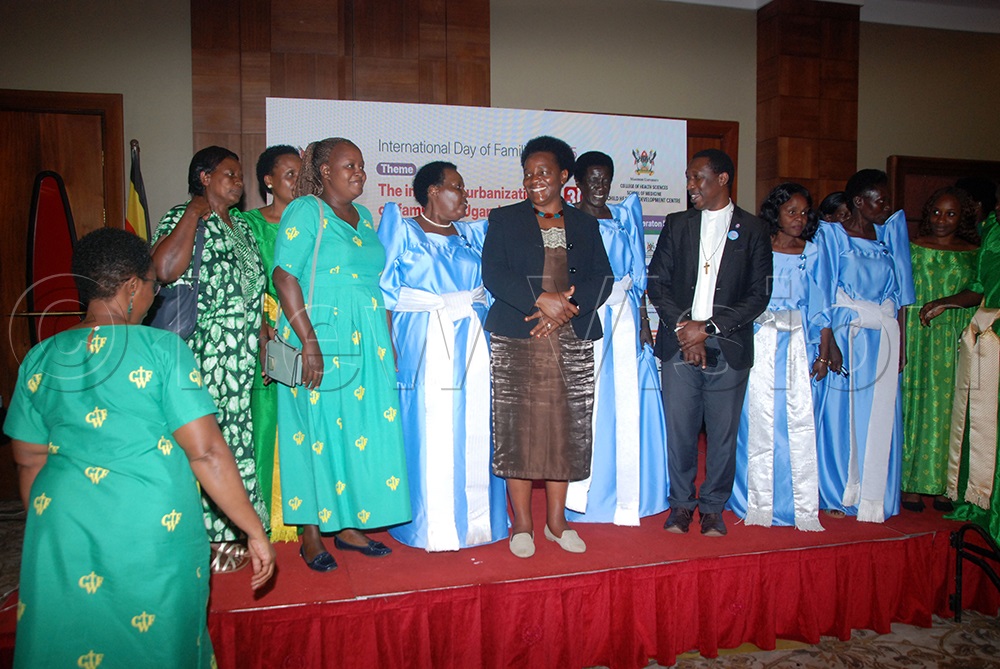Govt launches parenting tools to strengthen family systems
Mutuuzo noted that the launch marks a major milestone in the government’s ongoing efforts to promote positive parenting, safeguard children, and respond to the evolving challenges families face.
Peace Mutuzo, State Minister of Gender, Labour and Social Development (MGSD), signs on a dummy board to launch the National standards for parenting programs in Uganda at the Sheraton Hotel on July 30, 2025. (Photo by Wilfred Sanya)
_______________
As part of ongoing efforts to improve child development and family well-being, the government has unveiled a set of national parenting tools aimed at enhancing the quality of parenting and strengthening family support systems across Uganda.
The tools, launched during the International Day of Families celebration at Sheraton Hotel on Wednesday, July 30, include the National Standards for Parenting Programmes, National Data Hub, National Parenting Training Manual, and a Facilitator’s Guide for the National Manual on Parenting. These resources are designed to coordinate, guide, and assess parenting interventions nationwide.
State Minister for Gender and Culture Affairs at the Ministry of Gender, Labour and Social Development (MoGLSD), Peace Mutuuzo, who presided over the launch, emphasised the importance of these tools in improving the well-being of families.
“These tools are critical,” she said. “They will help us measure the standards of parenting in Uganda, coordinate the various players working in the parenting space, support consistent follow-up, and ensure that all interventions are rooted in our own Ugandan context.”
Mutuuzo noted that the launch marks a major milestone in the government’s ongoing efforts to promote positive parenting, safeguard children, and respond to the evolving challenges families face.
“In the past, we used to compare ourselves with countries like South Africa,” she explained. “Now we can measure our performance against our own standards. Parenting, which used to be based on word-of-mouth, is now documented. Even those without parents can use these guidelines to raise children according to acceptable standards.”
Why the tools were developed
When asked why the tools were developed, Mutuuzo responded, “We lacked guidelines. Each player was working in isolation. Now, all the efforts from policymakers, faith-based organisations, academicians, and even children have come together to create comprehensive standards. These tools allow us to evaluate each other and track progress more effectively.”
The development of the tools was spearheaded by MoGLSD, in partnership with Makerere University’s Child Health and Development Centre (CHDC), UNICEF, and other development partners.
Paul Opira, head of information technology at CHDC, who led the development alongside the IT team from MoGLSD, highlighted the importance of the Parenting Data Hub. He said it provides a centralised digital space for efficient data collection, information sharing, and documentation of parenting initiatives. It also enhances understanding of regional priorities in parenting programming, minimises duplication of services among partners, fosters stronger partnerships, and enables harmonised planning and delivery of interventions.
This year’s celebration ran under the theme: “The Impact of Urbanisation on Families in Uganda.”
Peace Mutuzo (centre), State Minister of Gender, Labour and Social Development (MoGLSD) poses for a group photo with members of the Christian Women Fellowship after launching the National standards for parenting programs in Uganda at Sheraton Hotel on July 30, 2025. (Photo by Wilfred Sanya)
Stress on families
In his keynote address, Dr Godfrey Siu, senior lecturer and programme lead of the families, parenting, and child health programme at Makerere University, pointed out that urbanisation has brought increased stress on families.
“Parents are working longer hours, leaving them with limited time to engage in parenting,” he said.
He noted that urbanisation has led to increased poverty, which has put families under strain, resulting in widespread family breakdown and numerous parenting challenges.
He stressed that there has been a growing increase in slum areas, largely due to the lack of affordable housing, which continues to affect families in urban settings.
“We have an increase in slum areas affecting families; they have to find better accommodation. Unfortunately, rent is expensive, and many families are unable to afford rent or decent housing,” Siu added.
As a result, families need targeted support and interventions that can help restore and strengthen the roles of both fathers and mothers within the urban family structure.
“Children are overwhelmed with academic pressure, waking as early as 5am and returning home at 8pm or 9pm with homework. Many parents don’t know how to respond to these challenges.”
UNICEF deputy representative Margarita Tileva said families are the foundation of society, a place where children first experience love, protection and learn values. Yet rapid urbanisation is straining this foundation, particularly for vulnerable families and children living in informal settlements.
“Urbanisation can lead to social isolation, breakdown of traditional support systems, and challenges in accessing education and other social services. The risks of violence, exploitation and abuse for children living in vulnerable situations in cities are real and a growing concern.”
Children speak out
Pupils also had a voice at the event. Jonathan Kashiringi, representing children from Deven Junior School, shed light on the challenges faced by children in urban areas.
He identified vulnerable groups, including street children, those engaged in child labour, children with disabilities, and those living in overcrowded or unsafe environments.
“These children face issues like cheap labour, child abuse, limited access to quality education and health care, poor housing, and in some cases, sexual exploitation especially affecting the innocent girl child,” Jonathan said.
He called for increased support to ensure every child, regardless of background, grows up in a safe, supportive family environment.